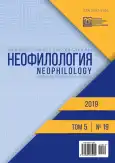Topoi as part of the argumentation schemes and their role in creating a positive image of the “self” and a negative image of the “other”
- Authors: Matytcina M.S.1
-
Affiliations:
- Lipetsk State Technical University
- Issue: Vol 5, No 19 (2019)
- Pages: 306-314
- Section: ЯЗЫКОЗНАНИЕ
- URL: https://journal-vniispk.ru/2587-6953/article/view/302936
- DOI: https://doi.org/10.20310/2587-6953-2019-5-19-306-314
- EDN: https://elibrary.ru/biwadu
- ID: 302936
Cite item
Full Text
Abstract
We analyze the main topoi used by English-language editorials to build their arguments in order to construct a negative image of immigrants. The relevance of this study is due to the specificity of the trends in the construction of immigration discourse and its various aspects, as evidenced by the large number of scientific works in both domestic and foreign science. The purpose of this study is to analyze the main topoi that actualize the discursive reproduction of negative attitude towards immigrants in the English-language press. We investigate the news reports from the American weekly magazine “Time”, the American news channel “FoxNews” and the British editorials “The Daily Mail”, “The Guardian” and “The Telegraph”. The main methodological basis is a critical discourse analysis, which is based on the understanding of discourse as a form of social interaction. We establish that the power elites construct the public opinion that is beneficial for the power bloc in relation to “others”, form and support negative images of “aliens” as representatives of other races, ethnic groups and cultures using the mass media. We analyze the main linguistic tools that identify topoi with respect to immigrants. We present the specific examples that demonstrate the features of topoi functioning in English-language editorials.
References
- Van Dijk T. Discourse and Power: Representation of Dominance in Language and Communication / transl. from English. 2nd ed. М.: Librokom; URSS Publ., 2015. 352 p.
- Župarić-Iljić D., Kuti S., Gregurović M. Attitudes towards immigrant workers and asylum seekers in Eastern Croatia: dimensions, determinants and differences // Migracijske i etničke teme. 2016. № 1. P. 91-122. doi: 10.11567/met.32.1.4
- Zapata-Barrero R., Caponio T., Scholten P. Theorizing the ‘local turn’ in a multi-level governance frame-work of analysis: a case study in immigrant policies // International Review of Administrative Sciences. 2017. Vol. 83. № 2. P. 241-246. doi: 10.1177/0020852316688426
- Khosravinik M. Immigration discourses and critical discourse analysis: dynamics of world events and immi-gration representations in the British press // Contemporary Critical Discourse Studies / ed. by C. Hart, P. Cap. London; New York: Bloomsbury Academic, 2014. P. 501-519.
- Malmqvist K. Satire, racist humour and the power of (un)laughter: On the restrained nature of Swedish on-line racist discourse targeting EU-migrants begging for money // Discourse and Society. 2015. Vol. 26. № 6. P. 733-753. doi: 10.1177/0957926515611792
- Musolff A. The heart of Europe: Synchronic variation and historical trajectories of a political metaphor // Speaking of Europe. Approaches to Complexity in European Political Discourse / ed. by K. Flottum. Ams-terdam: John Benjamins, 2013. P. 135-150.
- Mellouki S. The infusion of Islam into pluralistic politics: the need to explore the Islamist identity beyond ideological boundaries – The case of the Moroccan Party of Justice and Development // Discourse and So-ciety. 2015. Vol. 26. № 6. P. 662-681. doi: 10.1177/0957926515592778
- Strom M. Intersemiotic relationships in Spanish-language media in the United States: a critical analysis of the representation of ideology across verbal and visual modes // Discourse and Communication. 2015. Vol. 9. P. 487-508. doi: 10.1177/1750481315576838
- Toft A. Contesting the deviant other: discursive strategies for the production of homeless subjectivities // Discourse and Society. 2014. Vol. 25. P. 783-809. doi: 10.1177/0957926514536839
- Van Dijk T. Critical discourse analysis (new version) // Handbook of Discourse Analysis: in 2 vols. / ed. by D. Tannen, H. Hamilton, D. Schiffrin. 2nd ed. Chichester: Wiley Blackwell, 2015. Vol. 1. P. 466-485.
- Wodak R. The discourse-historical approach // Methods of Critical Discourse Analysis / ed. by R. Wodak, M. Meyer. London: Sage, 2011. P. 63-93.
- Kienpointner M. Alltagslogik: Struktur und Funktion von Argumentationsmustern. Stuttgart; Bad Cannstatt: Frommann-Holzboog Verlag, 1992. 447 S.
- Wodak R., Iedema R. Constructing boundaries without being seeing: the case of Jorg Haider, politician // Revista Canaria de Estudios Ingleses. 2004. № 49. P. 157-178.
- Kwon W., Clarke I., Wodak R. Micro-level discursive strategies for constructing shared views around stra-tegic issues in team meetings / ed. by T. Clark // Journal of Management Studies. 2014. Vol. 51. № 2. P. 265-290. doi: 10.1111/joms.12036
- Eemeren F.H., Houtlosser P., Henkemans A.F. Argumentative Indicators in Discourse: a Pragma-Dialectical Study. Dordrecht: Springer, 2007. 234 p.
- Tulmin S. The Uses of Argument. Cambridge: Cambridge University Press, 2003. 247 p.
- Bolton J. Migrant crisis isn't just Europe's problem, it's our problem, too. URL: https://www.foxnews.com/ opinion/migrant-crisis-isnt-just-europes-problem-its-our-problem-too (accessed: 02.03.2019).
- Pisa N. 2,500 illegal immigrants a week from North Africa flooding into Europe through Italy. URL: https://www.dailymail.co.uk/news/article-2003537/2-500-illegal-immigrants-week-North-Africa-flooding-Europe-Italy.html#ixzz5CAq9XsIb (accessed: 02.03.2019).
- Szakacs G., Than K. Orban: Hungary will arrest “rebellious” migrants. URL: https://www.dailymail.co.uk/ wires/reuters/article-3230753/Orban-Hungary-arrest-rebellious-migrants.html (accessed: 02.03.2019).
- Wodak R. The Discourse of Politics in Action. Politics as Usual. L.: Palgrave Macmillan, 2011. 252 p. doi: 10.1057/9780230316539
- Walt V. “We Want to change things from within”. Italy's Matteo Salvini on his goal to reshape Europe // Time. URL: https://time.com/5394207/%20matteo-salvini-time-interview-transcript-full/ (accessed: 02.03.2019).
- Graff J. Why Paris is burning. URL: http://content.time.com/time/world/article/0,8599,1125401,00.html (accessed: 02.03.2019).
Supplementary files









